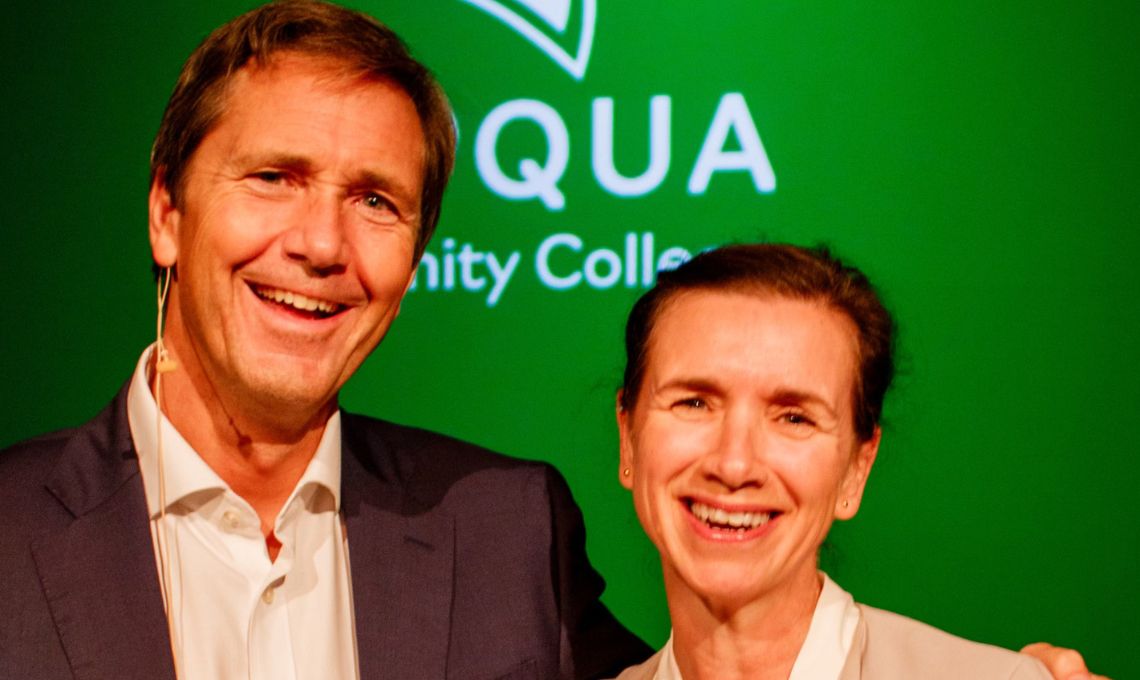Author Richard Reeves shares insights from his research in Of Boys and Men: Why the Modern Male Is Struggling, Why It Matters, and What to Do About It.
As colleges anticipate admissions season, higher education officials across our communities are bound to wonder: Where are all the young men? Richard Reeves, author of Of Boys and Men: Why the Modern Male Is Struggling, Why It Matters, and What to Do About It, came to Roseburg recently to talk about declining male enrollment and other complex and concerning trends before a packed auditorium at Umpqua Community College.
Reeves, a British-born father of three sons, has spent the last several years trying to better understand why many boys and men face challenges in education, the workforce and in family life. While men continue to hold positions of power in our society – representing the majority of top-paid CEOs, for example – Reeves reminds the audience that this is not a uniform “male” experience. Working class and rural men, most notably, are falling behind in a rapidly-modernizing economy. Boys are more likely to be expelled from, or dropout of, school than girls. And, Reeves notes, men and boys are less likely to seek out resources and support.
“Men are not participating in education, in the workforce and in their communities, and that is problematic on many fronts,” says Denise Callahan, Postsecondary Success director for The Ford Family Foundation. “Think of it from the perspective of a healthy economy and strong civic and social fabric — it has an impact on all of us.”

Disparities in education are a key part of the puzzle and directly affect men’s success in the workforce and other critical areas. Compared to girls, boys are less prepared to start school, less likely to take advanced placement courses and less likely to graduate high school. “The gender gap in college degrees is wider today than it was in the early ‘70s,” Reeves says, “but in the opposite direction.” For every 100 bachelor’s degrees awarded to women, just 72 are awarded to men, and the gap is growing.
Umpqua Community College president Rachel Pokrandt brought that issue home in her introductory comments about this trend in Douglas County. “When I came to UCC in 2022, I learned that we had about 600 fewer men graduating than we had 10 years previously,” she told the audience. “We started to call this our ‘600 Missing Men Project.’ And in the years since, we’ve implemented measures to begin to reverse that trend.”
A complex but solvable issue
The issues boys and men face are not inherent to their gender, Reeves says, but systemic — and that means they are solvable. The number of male teachers, who would serve as valuable mentors to their male students, is down; men remain underrepresented in HEAL professions (health, education, administration and literacy). And as Reeves shares from extensive research, boys’ brains develop at a different rate than girls. Tasks like turning in homework on time, which favors non-cognitive skills (e.g. self control, conscientiousness), don’t always align well with boys’ developmental strengths.
The solution, Reeves said, lies in making changes through evidence-based research. He offers up some recommendations, including hiring more male teachers, expanding vocational education and starting boys in school a year later than girls.
Callahan believes a number of factors could be addressed to begin changing the way men think about education and college. “Identifying mentors and using common-sense data to highlight the long-term benefits of education can help young men shift their focus — and motivation — to achieving something that is a little more distant,” she says.
In Oregon, a collaborative initiative is deploying multiple strategies to help rural men succeed in college, including mentoring and social activities to build community. Four community colleges are taking on the challenge of declining male enrollment and completion together through the Improving Community College Outcomes for Rural Oregon Men project supported by The Ford Family Foundation.
“The first day I accepted this job, our president walked in with Richard Reeves’ book and handed it to me,” says Umpqua Community College project coordinator Jacob Whisler, who also helps coach the college’s baseball team. “One of the things Reeves talks about is the importance of a mentor, and our work here is a direct reflection of that.”
Whisler and five of the male students he mentors attended Reeves’ talk and were able to share their college experience with Reeves, particularly the sense of loneliness and isolation they initially felt on campus. In fact, in Whisler’s interactions with high school students across Douglas County, the most widely-cited fear young men share about going to college, even locally, is feeling lost or alone.
Not a zero-sum game
One of Reeves’ main messages is that focusing attention on the issues surrounding boys and men does not mean ignoring the challenges still faced by girls and women. In fact, Reeves’ recently-launched think tank, the American Institute for Boys and Men, is supported by a $20 million grant from Melinda French Gates intended to foster gender equality.
“We can do more for boys and men without doing less for women and girls,” Reeves says. “We can be passionate about women’s rights and compassionate towards the struggles of boys and men.”
Callahan agrees. “It’s not an either-or issue; it’s not a zero-sum game.”
Reeves’ message found common ground among the diverse 200-plus audience of educators, students and community members. “I have daughters, not sons,” shared one parent after the talk, “but I want all of our kids to be successful. The stakes could not be higher.”


